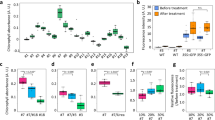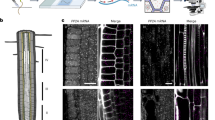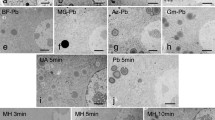Abstract
There is a growing demand for methods that allow rapid and reliable in situ localization of proteins in plant cells. The immunocytochemistry protocol presented here can be used routinely to observe protein localization patterns in tissue sections of various plant species. This protocol is especially suitable for plant species with more-complex tissue architecture (such as maize, Zea mays), which makes it difficult to use an easier whole-mount procedure for protein localization. To facilitate the antibody-antigen reaction, it is necessary to include a wax-embedding and tissue-sectioning step. The protocol consists of the following procedures: chemical fixation of tissue, dehydration, wax embedding, sectioning, dewaxing, rehydration, blocking and antibody incubation. The detailed protocol, recommended controls and troubleshooting are presented here, along with examples of applications.
This is a preview of subscription content, access via your institution
Access options
Subscribe to this journal
Receive 12 print issues and online access
$259.00 per year
only $21.58 per issue
Buy this article
- Purchase on Springer Link
- Instant access to full article PDF
Prices may be subject to local taxes which are calculated during checkout

Similar content being viewed by others
References
Reinhardt, P. et al. Regulation of phyllotaxis by polar auxin transport. Nature 426, 255–260 (1993).
Baluška, F., Parker, J.S. & Barlow, P.W. Specific patterns of cortical and endoplasmic microtubules associated with cell growth and tissue differentiation in roots of maize (Zea mays L.). J. Cell Sci. 103, 191–200 (1992).
Sauer, M., Paciorek, T., Benková, E. & Friml, J. Immunocytochemical techniques for whole-mount in situ protein localization in plants. Nat. Protocols doi:10.1038/nprot.2006.15.
Paciorek, T. et al. Auxin inhibits endocytosis and promotes its own efflux from cells. Nature 435, 1251–1256 (2005).
Friml, J., Wisniewska, J., Benková, E., Mendgen, K. & Palme, K. Lateral relocation of auxin efflux regulator AtPIN3 mediates tropism in Arabidopsis. Nature 415, 806–809 (2002).
Acknowledgements
We are grateful to F. Baluska, P. Knox, W. Michalke and K. Roberts for sharing material; we thank P. Brewer for critical reading of the manuscript and discussions. M.S., J.W. and J.F were supported by VolkswagenStiftung and the European Molecular Biology Organization Young Investigator Program; T.P. was supported by the Deutsche Forschungsgemeinschaft (SFB 446); and J.B. was supported by Grant Agency of Czech Republic (522/02/D137) and Ministry of Education of Czech Republic (MSM432100001).
Author information
Authors and Affiliations
Corresponding author
Ethics declarations
Competing interests
The authors declare no competing financial interests.
Rights and permissions
About this article
Cite this article
Paciorek, T., Sauer, M., Balla, J. et al. Immunocytochemical technique for protein localization in sections of plant tissues. Nat Protoc 1, 104–107 (2006). https://doi.org/10.1038/nprot.2006.16
Published:
Issue Date:
DOI: https://doi.org/10.1038/nprot.2006.16
This article is cited by
-
Architecture design of cucurbit crops for enhanced productivity by a natural allele
Nature Plants (2022)
-
A Dof-CLE circuit controls phloem organization
Nature Plants (2022)
-
A Method for a Rapid and Accurate Detection of Phloem Sieve Element Development: Its Application and Scalability
Journal of Plant Biology (2022)
-
An SHR–SCR module specifies legume cortical cell fate to enable nodulation
Nature (2021)
-
Protein trafficking in plant cells: Tools and markers
Science China Life Sciences (2020)
Comments
By submitting a comment you agree to abide by our Terms and Community Guidelines. If you find something abusive or that does not comply with our terms or guidelines please flag it as inappropriate.



